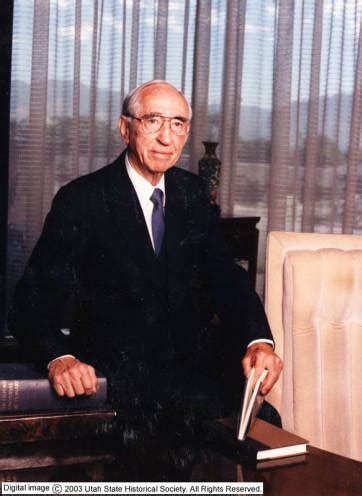Top 179 Gospels Quotes & Sayings - Page 3
Explore popular Gospels quotes.
Last updated on April 20, 2025.
I think the best thing a person can do is to read through the Gospels in the Bible and really look at Jesus, because if a person does this, they will realize that the Jesus they learned about in Sunday school or the Jesus they hear jokes about or the skinny, Gandhi Jesus that exists in their imaginations isn't anything like the real Jesus at all.
I am no theologian. I am a layman. I am among those who are preached to, and who listen. It is not for me to preach. I should not willingly forego being a listener, a man who reads the Gospels and then listens to what others say that our Lord meant. But sometimes a listener speaks out, and listens to his own voice.
Jesus himself, and most of the message of the Gospels, is a message of service to the poor, a critique of the rich and the powerful, and a pacifist doctrine. And it remained that way, that's what Christianity was up... until Constantine. :Constantine shifted it so the cross, which was the symbol of persecution of somebody working for the poor, was put on the shield of the Roman Empire. It became the symbol for violence and oppression, and that's pretty much what the church has been until the present.
If the resurrection of Jesus cannot be believed except by assenting to the fantastic descriptions included in the Gospels, then Christianity is doomed. For that view of resurrection is not believable, and if that is all there is, then Christianity, which depends upon the truth and authenticity of Jesus' resurrection, also is not believable.
If there were even one spark of evidence from antiquity that Jesus even may have gotten married, then as a historian, I would have to weigh this evidence against the total absence of such information in either Scripture or the early church traditions. But there is no such spark-not a scintilla of evidence-anywhere in historical sources. Even where one might expect to find such claims in the bizarre, second-century, apocryphal gospels...there is no reference that Jesus ever got married.
Owing to the identification of religion with virtue, together with the fact that the most religious men are not the most intelligent, a religious education gives courage to the stupid to resist the authority of educated men, as has happened, for example, where the teaching of evolution has been made illegal. So far as I can remember, there is not one word in the Gospels in praise of intelligence; and in this respect ministers of religion follow gospel authority more closely than in some others.
Most importantly for me growing up, it was a spirituals, it was a gospels, it was James Cleveland, Aretha Franklin, Marion Williams; and then it was Curtis Mayfield - The Main Ingredient, The Whispers, Black Blue Magic, James Brown, Aretha Franklin, Luther Vandross - that music helped me preserves my sanity, help me preserve whatever dignity I was able to preserve, helping to keep going. It was a source of tremendous strength in my life.
[Jew] didn't believe anything good could come out of a Jewish study. So, what has happened is anti-Semitism has cost the Jews their lives and their property. It's also cost the Christians the ability to read the old gospels, which are deeply, deeply Jewish, and to bring that out is a pretty exciting thing. I'm having a wonderful time with that. I'm just not near ready to do much with it.
You're looking at me as though I'm weird. My god! Are you so out of touch with most of America, most of which believes in the devil? I mean, Jesus Christ believed in the devil! It's in the Gospels! You travel in circles that are so, so removed from mainstream America that you are appalled that anybody would believe in the devil! Most of mankind has believed in the devil, for all of history. Many more intelligent people than you or me have believed in the devil.
Our attitude towards evil must be freed from hatred, and has itself need to be enlightened in character...Satan rejoices when he succeeds in inspiring us with diabolical feelings to himself. It is he who wins when his own methods are used against himself...A continual denunciation of evil and its agents merely encourages its growth in the world a truth sufficiently revealed in the Gospels, but to which we are persistently blind.
If man had written the Gospels - say Shakespeare or Eugene O'Neill - the story of the gospel would have been drastically different. They would have placed the prince in halls and palaces and had him walking among the great. They would have had him surrounded by the important and significant of the time. Potentates and kings would have been His companions. But how sweetly common was the real God-man; though He had inhabited all eternity, He had come down and was subject to the rising and the setting of the sun.
I am perfectly convinced that whatever the gospels are they are not legends. I have read a great deal of legend and I am quite clear they are not that sort of thing....Christ bent down and scribbled in the dust with His finger. Nothing comes of this. No one has based any doctrine on it. And the act of inventing little irrelevant details to make an imaginary scene more convincing is purely a modern art.
The early Christians' opponents all accepted that Jesus existed, taught, had disciples, worked miracles, and was put to death on a Roman cross. As in our day, debate and disagreement centred largely not on the story but on the significance of Jesus. Today nearly all historians, whether Christians or not, accept that Jesus existed and that the gospels contain plenty of valuable evidence which has to be weighed and assessed critically.
Deep inside I feel that this world we live in is really a big, huge, monumental symphonic orchestra. I believe that in its primordial form all of creation is sound and that it's not just random sound, that it's music. You've heard the expression, music of the spheres? Well, that's a very literal phrase. In the Gospels, we read, "And the Lord God made man from the dust of the earth and breathed into his nostrils the breath of life and man became a living soul." That 'breath of life' to me is the music of life and it permeates every fiber of creation.
... we can see both that love for God is begotten from the virtues and that virtues are born of love. For this reason the Lord said at one point in the Gospels, 'He who has My commandments and keeps them is the one who loves Me' (Jn. 14:21), and at another point, 'He who loves Me will keep My commandments' (cf. Jn. 14:23).
If one accepts the 24th and 104th Psalms as scriptural norms, then surface mining and other forms of earth destruction are perversions. If we take the Gospels seriously, how can we not see industrial warfare - with its inevitable massacre of innocents - as a most shocking perversion? By the standard of all scriptures, neglect of the poor, of widows and orphans, of the sick, the homeless, the insane, is an abominable perversion.
The church has been preoccupied with the question, 'What happens to your soul after you die?' AS IF THE REASON FOR JESUS COMING CAN BE SUMMED UP IN, 'JESUS IS TRYING TO HELP GET MORE SOULS INTO HEAVEN, AS OPPOSED TO HELL, AFTER THEY DIE.' I JUST THINK A FAIR READING OF THE GOSPELS BLOWS THAT OUT OF THE WATER. I don't think that the entire message and life of Jesus can be boiled down to that bottom line
On the Cross the Jesus of the Four Gospels, who was God, cried out My God, my God, why hast thou forsaken me? God cannot forsake himself, Jesus was God himself. Yet God forsook Jesus, and the latter cried out to know why he was forsaken. Any able divine will explain that of course he knew, and that he was not forsaken. The explanation renders it difficult to believe the dying cry, and the passage becomes one of the mysteries of the holy Christian religion, which, unless a man rightly believe, without doubt he shall perish everlastingly.
Yes, I heard my people singing!-in the glow of parlor coal-stove and on summer porches sweet with lilac air, from choir loft and Sunday morning pews-and my soul was filled with their harmonies. Then, too, I heard these songs in the very sermons of my father, for in the Negro's speech there is much of the phrasing and rhythms of folk-song. The great, soaring gospels we love are merely sermons that are sung; and as we thrill to such gifted gospel singers as Mahalia Jackson, we hear the rhythmic eloquence of our preachers, so many of whom, like my father, are masters of poetic speech.
The Old Testament records the preparation for the coming of the Messiah. The Gospels record the coming of the Messiah, Jesus Christ our Lord. The book of Acts records the propagation of the gospel (the good news) concerning Jesus Christ. The Epistles (letters) explain the gospel and its implications for our lives. The book of Revelation anticipates and describes the second coming of Jesus Christ and the establishment of His eternal kingdom. From beginning to end, the Bible glorifies Jesus Christ and centers on Him. Its Christ-centeredness is one of its wonderful features.
But technology is the real skin of our species. Humanity, correctly seen in the context of the last five hundred years, is an extruder of technological material. We take in matter that has a low degree of organization; we put it through mental filters, and we extrude jewelry, gospels, space shuttles. This is what we do. We are like coral animals embedded in a technological reef of extruded psychic objects. All our tool making implies our belief in an ultimate tool. That tool is the flying saucer, or the soul, exteriorized in three-dimensional space.
The whole history of these books (i.e. the Gospels) is so defective and doubtful that it seems vain to attempt minute enquiry into it: and such tricks have been played with their text, and with the texts of other books relating to them, that we have a right, from that cause, to entertain much doubt what parts of them are genuine. In the New Testament there is internal evidence that parts of it have proceeded from an extraordinary man; and that other parts are of the fabric of very inferior minds. It is as easy to separate those parts, as to pick out diamonds from dunghills.
One of my great experiences in life was to be interviewed on a late-night talk show by a guy named Tom Snyder. He was interviewing me on a book I had written on the New Testament of the Bible called Rescuing the Bible from Fundamentalism, and we talked about the dating of the books of the New Testament, and I said, "Well, the consensus is that the gospels were written some forty to seventy years after the crucifixion." And he stopped me and said, "Wait a minute, Bishop, that means they couldn't have been written by eyewitnesses."
If... Adam had trusted in God and been nourished from the tree of life (Gn. 2:9)? he would not have set aside the immortality that had been granted. For such immortality is eternally preserved by participation in life, since all life is genuine and preserved by appropriate food. The food of that blessed life is 'the bread that came down from heaven and gives life to the world' (Jn. 6:33), just as the inerrant Word Himself declares about Himself in the Gospels.
I'm reading the Gospels at the moment and I can find no evidence of the kind of Christ people seem to have invented and created. There is no evidence of Christ, meek and mild. I can find Christ the compassionate, the gentle, but I also find a very temperamental, aggressive, passionate and often angry man a lot of the time. We will go for a man with that sort of breadth who is an enormous figure. I do believe Christ lived as a person. I don't think there is any disputing that.
Our reasons for believing Jesus existed and also that He was who He claimed to be - the God who came down - are the same reasons for believing any fact of history: the documentation is substantial and it passes all the tests of historical reliability. Scholars - both liberal and conservative - overwhelming agree that Jesus of Nazareth was a man of history and the Gospels, on the main, tell His story accurately.
Kaplan can't understand trivialities. The triviality here is that nobody except the ultra right-wing jingoists like Kaplan are comparing atrocities by various countries. What honest people are saying seems to be incomprehensible: that we should keep to the elementary moral level of the gospels. We should pay attention to our own crimes and stop committing them. This would be true even if we were killing one person, OK? And it's even more true when we're killing millions of people.
Life of the soul is union with God, as life of the body is union with the soul. As the soul was separated from God and died in consequence of the violation of the commandment, so by obedience to the commandment it is again united to God and is quickened. This is why the Lord says in the Gospels, 'The words I speak to you are spirit and life' (Jn. 6:63).
As I have read the Gospels over the years, the belief has grown in me that Christ did not come to found an organized religion but came instead to found an unorganized one. He seems to have come to carry religion out of the temples into the fields and sheep pastures, onto the roadsides and the banks of the rivers, into the houses of sinners and publicans, into the town and the wilderness, toward the membership of all that is here. Well, you can read and see what you think.
In every Magical, or similar system, it is invariably the first condition which the Aspirant must fulfill: he must once and for all and for ever put his family outside his magical circle.Even the Gospels insist clearly and weightily on this.Christ himself (i.e. whoever is meant by this name in this passage) callously disowns his mother and his brethren (Luke VIII, 19). And he repeatedly makes discipleship contingent on the total renunciation of all family ties. He would not even allow a man to attend his father's funeral!Is the magical tradition less rigid?Not on your life!
The Gospels were written in such temporal and geographical proximity to the events they record that it would have been almost impossible to fabricate events. Anyone who cared to could have checked out the accuracy of what they reported. The fact that the disciples were able to proclaim the resurrection in Jerusalem in the face of their enemies a few weeks after the crucifixion shows that what they proclaimed was true, for they could never have proclaimed the resurrection under such circumstances had it not occurred.
When Jesus came to earth, demons recognized him, the sick flocked to him, and sinners doused his feet and head with perfume. Meanwhile he offended pious Jews with their strict preconceptions of what God should be like. Their rejection makes me wonder, could religious types be doing just the reverse now? Could we be perpetuating an image of Jesus that fits our pious expectations but does not match the person portrayed so vividly in the Gospels?
What havoc has been made of books through every century of the Christian era? Where are fifty gospels, condemned as spurious by the bull of Pope Gelasius? Where are the forty wagon-loads of Hebrew manuscripts burned in France, by order of another pope, because suspected of heresy? Remember the 'index expurgatorius', the inquisition, the stake, the axe, the halter and the guillotine.
Beyond the earliest days of the religion, early Christians were believers because they'd been converted, not because they were witnesses to supernatural events, just like today. The 9/11 hijackers believed in Paradise for martyrs, but that doesn't mean that that's true. We have no good reason to imagine that eyewitnesses wrote the gospels rather than someone simply documenting the Jesus story as it had developed within their church community.
In the Gospels, for instance, we sometimes find the kingdom of heaven illustrated by principles drawn from observation of this world rather than from an ideal conception of justice; ... They remind us that the God we are seeking is present and active, that he is the living God; they are doubtless necessary if we are to keep religion from passing into a mere idealism and God into the vanishing point of our thought and endeavour.
If... we choose death rather than true life, God does not take away the power that He gave us. And not only does He not take it away, but He reminds us of it again and again. From the dawn till the dusk of life? For, indeed, no one can come to Christ, as He Himself said in the Gospels, unless the Father draws him (cf. Jn. 6:44).
The Church was resolved to have a New Testament, and as, after the lapse of more than three hundred years, no handwriting could be proved or disproved, the Church, which like former impostors had then gotten possession of the State, had everything its own way. It invented creeds, such as that called the Apostle's Creed, the Nicean Creed, the Athanasian Creed, and out of the loads of rubbish that were presented it voted four to be Gospels, and others to be Epistles, as we now find them arranged.
There's no possibility for vitality in the church without fidelity to the gospels. If you look at the Churches throughout the world, throughout the Western world, where radical reform has been attempted, the Church has collapsed and almost disappeared. The vitality in the Church, the young people who are here in their tens of thousands, hundreds of thousands possibly, young people who belong, who adhere strongly to the central tradition of Christ and the Church.
The differing opinions regarding the gospel are often categorized as different variations of the same truth, or coming at the same truth from different angles, or even emphasizing different aspects of the same truth. This fails to recognize that the different 'variations' are often altogether different gospels. The Reformed gospel is completely different from the Roman Catholic gospel; a faith-based gospel is in direct contradiction to a works-based gospel; a truly evangelical gospel stands in contrast to an ultracharismatic gospel.
The New Testament was not produced as a single work issued by an authoritative Church for the instruction of its members. The four Gospels were composed in different times and places over perhaps a third of a century, and for a time circulated separately among a number of other narratives of our Lord's life (of which the newly discovered fragment of an unknown gospel may have been one).
Perhaps the highest goodness attainable is a life of service to all mankind. Such an ideal is supported in nearly every page in the Gospels-the parables, the sermons, and the countless acts of service by our Lord Himself. The ideal is not limited to any particular kind of service, nor a given quantity of service. The ideal is accepting life itself as a trust to be used in the welfare of mankind. It is a life that is glad for the chance to be of any help, an attitude that 'service is the rent we pay for our own room on earth.' (Lord Halifax)
In broad outline and in detail, the life of Jesus as portrayed in the gospels corresponds to the worldwide Mythic Hero Archetype in which a divine hero's birth is supernaturally predicted and conceived, the infant hero escapes attempts to kill him, demonstrates his precocious wisdom already as a child, receives a divine commission, defeats demons, wins acclaim, is hailed as king, then betrayed, losing popular favor, executed, often on a hilltop, and is vindicated and taken up to heaven.
I am a Jew, but I am enthralled by the luminous figure of the Nazarene. Jesus is too colossal for the pen of phrasemongers, however artful." He further added: "No man can read the gospels without feeling the actual presence of Jesus. His personality pulsates in every word. No myth is filled with such life...Theseus and other heroes of his type lack the authentic vitality of Jesus.
Muhammad brought down from heaven and put into the Koran not religious doctrines only, but political maxims, criminal and civil laws, and scientific theories. The Gospels on the other hand, deal only with the general relations between man and God and between man and man. Beyond that, they teach nothing and do not oblige people to believe anything. That alone, among a thousand reasons, is enough to show that Islam will not be able to hold its power long in ages of enlightenment and democracy, while Christianity is destined to reign in such ages, as in all others.
Christianity is actually "true Truth," as Francis Schaeffer used to put it. God really does exist, Heaven actually is real (along with Hell), Jesus really did live and He did the things the historical records - the Gospels - say He did, the resurrection of Christ really happened, and there really is hope each of us can count on for "the kind of perfect world our hearts have always longed for."
Does it take a blanket presupposition for a historian to discount some miracle stories as legendary? No, because, as even Bultmann recognized, there is no problem accepting reports even of extraordinary things that we can still verify as occurring today, like faith healings and exorcisms. However you may wish to account for them, you can go to certain meetings and see scenes somewhat resembling those in the gospels. So it is by no means a matter of rejecting all miracle stories on principle. Biblical critics are not like the Committee for Scientific Investigation of Claims of the Paranormal.
Here in the UK, we've now got an evangelical television channel - it's the kind of thing that will be very familiar to everyone in the United States, especially if you've ever turned on your TV set on a Sunday morning, and seen one holy man after another, urging you to send money so that Jesus can buy a new cadillac. Apparently, Jesus can't save the world until he's been properly kitted out with a million-dollar mansion, and a private jet - some small print in the Gospels that we must have missed.
I once heard a theologian remark that in the Gospels people approached Jesus with a question 183 times whereas he replied with a direct answer only three times. Instead, he responded with a different question, a story, or some other indirection. Evidently Jesus wants us to work out answers on our own, using the principles that he taught and lived.
About six years ago, Life magazine ran an article on the historicity of Jesus and I was floored to find that they conceded the only evidence we have for his existence is in the Gospels. But don't take Life's word for it. In his book The Quest of the Historical Jesus, the most definitive study that's ever been done on the subject, Albert Schweitzer admitted that there isn't a shred of conclusive proof that Christ ever lived, let alone was the son of God. He concludes that one must therefore accept both on faith.
One would naturally expect that the Lord Jesus Christ would be sufficiently important to receive ample notice in the literature of his time, and that extensive biographical material would be available. He was observed by multitudes of people, and his own followers numbered into the hundreds (1 Cor. 15:6), whose witness was still living in the middle of the first century. As a matter of fact, the amount of information concerning him is comparatively meager. Aside from the four Gospels, and a few scattered allusions in the epistles, contemporary history is almost silent concerning him.
The Gospels record that nearly everywhere the Savior went, He was surrounded by multitudes of people. Some hoped that He would heal them; others came to hear Him speak. Others came for practical advice. Toward the end of His mortal ministry, some came to mock and ridicule Him and to clamor for His crucifixion.
The more we know of the fixed laws of nature the more incredible do miracles become, - that the men at that time were ignorant and credulous to a degree almost incomprehensible by us, - that the Gospels cannot be proved to have been written simultaneously with the events, - that they differ in many important details, far too important as it seemed to me to be admitted as the usual inaccuracies of eye-witnesses; - by such reflections as these... I gradually came to disbelieve in Christianity as a divine revelation.
It's important, though, that there are not "four gospels." There is only one gospel: the good news of what God has done through Christ to save the world. But we read that one gospel in four complementary accounts: The gospel, according to Matthew, according to Mark, according to Luke, according to John.

















































